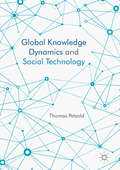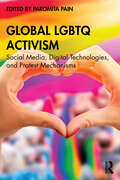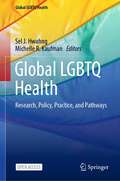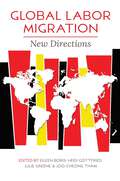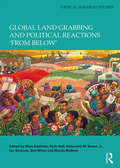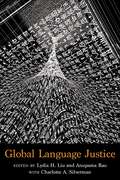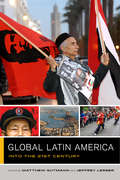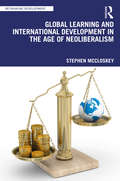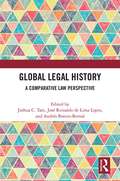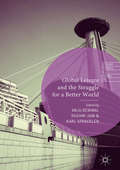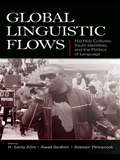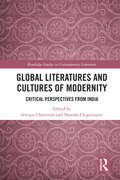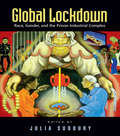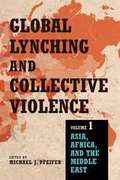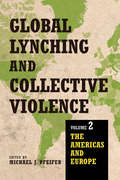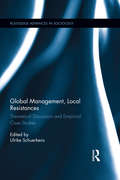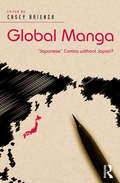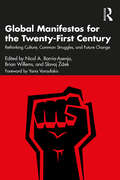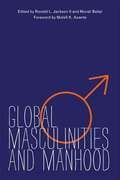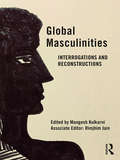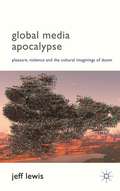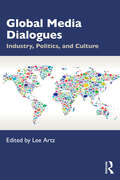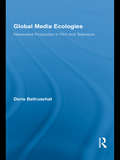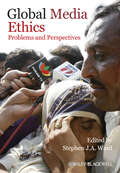- Table View
- List View
Global Knowledge Dynamics and Social Technology
by Thomas PetzoldThis volume unpacks an intriguing challenge for the field of media research: combining media research with the study of complex networks. Bringing together research on the small-world idea and digital culture it questions the assumption that we are separated from any other person on the planet by just a few steps, and that this distance decreases within digital social networks. The book argues that the role of languages is decisive to understand how people connect, and it looks at the consequences this has on the ways knowledge spreads digitally. This volume offers a first conceptual venue to analyse emerging phenomena at the innovative intersection of media and complex network research.
Global LGBTQ Activism: Social Media, Digital Technologies, and Protest Mechanisms
by Paromita PainFocused on understanding and analyzing LGBTQ activism and protest globally, this edited collection brings together voices from different parts of the world to examine LGBTQ protests and their impact. Through the lens of media, culture, and sociopolitical structures, this collection highlights how cultural and technical factors like the emergence of social media and other digital platforms have impacted LGBTQ activism. This book draws on studies from countries as varied as Zimbabwe, Bangladesh, Sri Lanka, Hungary, Morocco, China, and the US. The contributions provide important insight into how social media and digital platforms have provided space for self-expression and protest and encouraged advocacy and empowerment for LGBTQ movements. It also examines the diversity and similarities between different national contexts and the various obstacles faced, while spotlighting countries that are traditionally understudied in Western academia, in an important step toward decolonizing research. Each chapter, through the voices of activists and media scholars, moves beyond an oversimplified examination of queer protests to show, in rich detail, the exciting yet complicated terrain of queer protests throughout the globe. This book is suitable for media, communication, and cultural studies students; researchers; academics; and LGBTQ activists, as well as students and scholars from related academic disciplines.
Global LGBTQ Health: Research, Policy, Practice, and Pathways (Global LGBTQ Health)
by Sel J. Hwahng Michelle R. KaufmanThis open access book is a groundbreaking volume that creates a new field within the intersection of “global health” and “LGBTQ health” delineating specific health challenges and resiliencies. There has been increasing awareness of the importance in recognizing LGBTQ health issues and disparities. However, there is a dearth of research and scholarship that examines LGBTQ health through global and comparative perspectives. This book addresses this gap.In the pursuit of scientific inquiry, the disciplines in public health have often emphasized reductionist perspectives that are particularized to a specific locale, municipality, or country. This book's provision of broader perspectives, cross-cutting disparities and issues, and socio-political-cultural contextualization inform the development of new research, policies, interventions, and programs. Students benefit by learning about LGBTQ health research, policies, and programs in various countries and regions. Public health researchers benefit by learning about research conducted in various countries and regions, along with understanding how research has been linked to and impacted by various policies and programs. Policymakers benefit from learning about overarching and comparative perspectives that could inform more effective policies, including those connected to multiple locations. Practitioners learn about various public health practices in multiple countries and regions that could contribute to novel and creative solutions and approaches within the respective contexts. The nine chapters of this volume facilitate greater socio-political-cultural awareness, sensitivity, and competence; undertake an in-depth literature review of health factors and outcomes; and provide recommendations for increasing health-related capacity through development and collaborations between agencies, organizations, and institutions across countries and/or regions. Global LGBTQ Health: Research, Policy, Practice, and Pathways is primarily intended for students and instructors in public health, medicine, nursing, other health professions, psychology, social work, LGBTQ or gender/sexuality studies, human rights, and the social sciences. The book is also a useful resource for public health researchers and practitioners, policymakers, and healthcare and social service providers.
Global Labor Migration: New Directions (Studies of World Migrations)
by Eileen Boris Bridget Anderson Pun Ngai Julie Greene Heidi Gottfried Judy Fudge Jenny Chan Rutvica Andrijasevic Radhika Natarajan Matt Withers Joo-Cheong Tham Nicola Piper Helen Sampson Katie Bales Penelope Ciancanelli Felipe Barradas Bastos Charlie Fanning Jorge L Giovannetti-Torres Justin Jackson Bastiaan Nugteren Jessica R Pliley Devi Sacchetto Yael SchacherAround the world, hundreds of millions of labor migrants endure exploitation, lack of basic rights, and institutionalized discrimination and marginalization. What dynamics and drivers have created a world in which such a huge--and rapidly growing--group toils as marginalized men and women, existing as a lower caste institutionally and juridically? In what ways did labor migrants shape their living and working conditions in the past, and what opportunities exist for them today? Global Labor Migration presents new multidisciplinary, transregional perspectives on issues surrounding global labor migration. The essays go beyond disciplinary boundaries, with sociologists, ethnographers, legal scholars, and historians contributing research that extends comparison among and within world regions. Looking at migrant workers from the late nineteenth century to the present day, the contributors illustrate the need for broader perspectives that study labor migration over longer timeframes and from wider geographic areas. The result is a unique, much-needed collection that delves into one of the world’s most pressing issues, generates scholarly dialogue, and proposes cutting-edge research agendas and methods. Contributors: Bridget Anderson, Rutvica Andrijasevic, Katie Bales, Jenny Chan, Penelope Ciancanelli, Felipe Barradas Correia Castro Bastos, Eileen Boris, Charlie Fanning, Judy Fudge, Jorge L. Giovannetti-Torres, Heidi Gottfried, Julie Greene, Justin Jackson, Radhika Natarajan, Pun Ngai, Bastiaan Nugteren, Nicola Piper, Jessica R. Pliley, Devi Sacchetto, Helen Sampson, Yael Schacher, Joo-Cheong Tham, and Matt Withers
Global Land Grabbing and Political Reactions 'from Below' (Critical Agrarian Studies)
by Wendy Wolford Ian Scoones Ruth Hall Ben White Saturnino M. Borras Jr. Marc EdelmanWhen the 2007-2008 food and financial crises triggered a global wave of land grabbing, scholars, activists and policy practitioners assumed that this would be met with massive peasant resistance. As empirical evidence accumulated, however, it became clear that political reactions ‘from below’ to land grabbing were quite varied and complex. Violent resistance, outright expulsions, everyday ‘weapons of the weak’ and demands for better terms of incorporation into land deals were among the outcomes that emerged. Readers of this collection will encounter a multinational group of scholars who use the tools of social movements theory and critical agrarian studies to examine cases from Argentina, Mexico, Guatemala, Nicaragua, Colombia, Ethiopia, Madagascar, Mozambique, Uganda, Mali, Ukraine, India, and Laos, as well as the Rio +20 Sustainable Development Conference. Initiatives ‘from below’ in response to land deals have involved local and transnational alliances and the use of legal and extra-legal methods, and have brought victories and defeats. This book was first published as a special issue of The Journal of Peasant Studies.
Global Language Justice
by Liu, Lydia H.; Rao, AnupamaMore than 40 percent of the world’s estimated 7,100+ languages are in danger of disappearing by the end of this century. As with the decline of biodiversity, language loss has been attributed to environmental degradation, developmentalism, and the destruction of Indigenous communities. This book brings together leading experts and younger scholars across the humanities and social sciences to investigate what global language justice looks like in a time of climate crisis. Examining the worldwide loss of linguistic diversity, they develop a new conception of justice to safeguard marginalized languages.Global Language Justice explores the socioeconomic transformations that both accelerate the decline of minoritized languages and give rise to new possibilities through population movement, unexpected encounters, and technological change. It also critically examines the concepts that are typically deployed to defend linguistic diversity, including human rights, inclusiveness, and equality. Contributors take up topics such as mapping language communities in New York City or how Indigenous innovation challenges notions of linguistic purity. They demonstrate the need to reckon with linguistic diversity in order to achieve a sustainable global economic system and show how the concept of digital vitality can push language justice in new directions. Interspersed with their essays are multilingual works by world-renowned poets and artists that engage with and deepen the book’s themes. Integrating ambitious theoretical exploration with concrete solutions, Global Language Justice offers vital new perspectives on the place of linguistic diversity in ongoing ecological crises.
Global Latin America: Into the Twenty-First Century
by Matthew C. Gutmann Jeffrey LesserLatin America is home to emerging global powers such as Brazil and Mexico and has important links to other titans including China, India, and Africa. Global Latin America examines a range of historical events and cultural forms in Latin America that continue to influence peoples' lives far outside the region. Its innovative essays, interviews, and stories focus on insights from public intellectuals, political leaders, artists, academics, and activists from the region, allowing students to gain an appreciation of the global relevance of Latin America in the twenty-first century.
Global Learning and International Development in the Age of Neoliberalism (Rethinking Development)
by Stephen McCloskeyThis book argues that the international development sector is in crisis which can be mostly sourced to its side-stepping the dominant development question of our age, the neoliberal growth paradigm. It argues that this crisis can be addressed, at least in part, by the sector’s re-engagement with the radical development education process that it helped to foster and sustain for over two decades. The recent safeguarding scandal is symptomatic of a sector that is becoming overly hierarchical, brand conscious and disconnected from its base. This book argues that many of the problems the sector is facing can be sourced to its failings in grappling with the question of neoliberalism and formulating a coherent critique of how market orthodoxy has accelerated poverty in the global North and South. This book recommends re-embracing the radical origins of global learning, situated in the participative methodology and praxis (reflection and action) of Paulo Freire, both as internal capacity-building and external public engagement. The book proposes a new development paradigm, focusing on bottomup, participative approaches to policy-making based on the needs of those NGOs claim to represent – the poor, marginalised and voiceless – rather than constantly following the agenda of donors and governments. The recommendations made by this book will serve as an important resource for researchers and students of international development and global learning, as well as to NGOs, civil society activists and education practitioners looking for solutions to the problems within the sector.
Global Legal History: A Comparative Law Perspective
by Joshua C. Tate José Reinaldo de Lima Lopes Andrés Botero-BernalThis collection brings together a group of international legal historians to further scholarship in different areas of comparative and regional legal history. Authors are drawn from Europe, Asia, and the Americas to produce new insights into the relationship between law and society across time and space. The book is divided into three parts: legal history and legal culture across borders, constitutional experiences in global perspective, and the history of judicial experiences. The three themes, and the chapters corresponding to each, provide a balance between public law and private law topics, and reflect a variety of methodologies, both empirical and theoretical. The volume highlights the gains that may be made by comparing the development of law in different countries and different time periods. The book will be of interest to an international readership in Legal History, Comparative Law, Law and Society, and History.
Global Leisure and the Struggle for a Better World (Leisure Studies in a Global Era)
by Karl Spracklen Anju Beniwal Rashmi JainThis edited collection highlights the diversity and reach of global leisure studies and global leisure theory. It explores the impact of globalization on leisure, and the sites of resistance and accommodation found in local, virtual and global leisure spaces.Unlike any other collection on leisure studies, Global Leisure and the Struggle for a Better World is truly representative of the diversity of the large and growing leisure scholarship across the globe. It demonstrates how researchers in leisure studies and sociology of leisure are applying complex theory to their work, and how a new theory of global leisure is emerging.
Global Linguistic Flows: Hip Hop Cultures, Youth Identities, and the Politics of Language
by Alastair Pennycook Awad Ibrahim H. Samy AlimLocated at the intersection of sociolinguistics and Hip Hop Studies, this cutting-edge book moves around the world – spanning Africa, Asia, Australia, the Americas and the European Union – to explore Hip Hop cultures, youth identities, the politics of language, and the simultaneous processes of globalization and localization. Focusing closely on language, these scholars of sociolinguistics, linguistic anthropology, cultural studies, and critical pedagogies offer linguistic insights to the growing scholarship on Hip Hop Culture, while reorienting their respective fields by paying closer attention to processes of globalization and localization. The book engages complex processes such as transnationalism, (im)migration, cultural flow, and diaspora in an effort to expand current theoretical approaches to language choice and agency, speech style and stylization, codeswitching and language mixing, crossing and sociolinguistic variation, and language use and globalization. Moving throughout the Global Hip Hop Nation, through scenes as diverse as Hong Kong’s urban center, Germany’s Mannheim inner-city district of Weststadt, the Brazilian favelas, the streets of Lagos and Dar es Salaam, and the hoods of the San Francisco Bay Area, this global intellectual cipha breaks new ground in the ethnographic study of language and popular culture.
Global Literatures and Cultures of Modernity: Critical Perspectives from India (Routledge Studies in Contemporary Literature)
by Srirupa Chatterjee Sharada ChigurupatiGlobal Literatures and Cultures of Modernity: Critical Perspectives from India brings together essays written by academicians and scholars from India to scrutinize how global modernities have been shaped since World War II, from the Indian perspective.It examines the literary musings of Anglophone writers hailing from various parts of the globe whose diverse voices present compelling narratives on modernity vis-à-vis the human condition. This volume brings together critical essays on writers such as Girish Karnad, Anita Desai, Anita Nair, and Jean Arasanayagam to examine the South Asian experience; by Chimamanda Ngozi Adichie and Naguib Mahfouz to explore the African and Arabic world order; by Jane Harrison and Wesley Enoch to address the Australian aboriginal condition; by William Golding, Kazuo Ishiguro, and Sarah Kane to scrutinize British cultural politics; by Jamaica Kincaid and Elizabeth Acevedo to highlight Latin American and Caribbean modernity, and last but not the least, by John Updike, Cormac McCarthy, and Mary Gordon to analyze North American politico-religious experiences of modernity. The diverse themes in this book therefore touch upon historical trauma, religious revisioning, masculinity, feminist debates, gender studies, ethnic discrimination and diversity, and caste and class politics, among many others.The book’s varied themes are united by the fact that they all converse with global and transnational dynamics shaped by post-war modernity that define our world today. The book crafts narratives on contemporary global literatures and the modern conditions they represent and does so from the vantage point of postmillennial Indian literary scholarship.
Global Lockdown: Race, Gender, and the Prison-Industrial Complex
by Julia SudburyGlobal Lockdown is the first book to apply a transnational feminist framework to the study of criminalization and imprisonment. The distinguished contributors to this collection offer a variety of perspectives, from former prisoners to advocates to scholars from around the world. The book is a must-read for anyone concerned by mass incarceration and the growth of the prison-industrial complex within and beyond U.S. borders, as well as those interested in globalization and resistance.
Global Lynching and Collective Violence: Asia, Africa, and the Middle East
by Michael J. PfeiferOften considered peculiarly American, lynching in fact takes place around the world. In the first book of a two-volume study, Michael J. Pfeifer collects essays that look at lynching and related forms of collective violence in Africa, Asia, and the Middle East. Understanding lynching as a transnational phenomenon rooted in political and cultural flux, the writers probe important issues from Indonesia--where a long history of public violence now twines with the Internet--to South Africa, with its notorious history of necklacing. Other scholars examine lynching in medieval Nepal, the epidemic of summary executions in late Qing-era China, the merging of state-sponsored and local collective violence during the Nanking Massacre, and the ways public anger and lynching in India relate to identity, autonomy, and territory. Contributors: Laurens Bakker, Shaiel Ben-Ephraim, Nandana Dutta, Weiting Guo, Or Honig, Frank Jacob, Michael J. Pfeifer, Yogesh Raj, and Nicholas Rush Smith.
Global Lynching and Collective Violence: The Americas and Europe
by Michael J. PfeiferIn this second volume of the groundbreaking survey, Michael J. Pfeifer edits a collection of essays that illuminates lynching and other extrajudicial "rough justice" as a transnational phenomenon responding to cultural and legal issues. The volume's European-themed topics explore why three communities of medieval people turned to mob violence, and the ways exclusion from formal institutions fueled peasant rough justice in Russia. Essays on Latin America examine how lynching in the United States influenced Brazilian debates on race and informal justice, and how shifts in religious and political power drove lynching in twentieth century Mexico. Finally, scholars delve into English Canadians' use of racist and mob violence to craft identity; the Communist Party's Depression-era campaign against lynching in the United States; and the transnational links that helped form--and later emanated from--Wisconsin's notoriously violent skinhead movement in the late twentieth century. Contributors: Brent M. S. Campney, Amy Chazkel, Stephen P. Frank, Dean J. Kotlowski, Michael J. Pfeifer, Gema SantamarÃa, Ryan Shaffer, and Hannah Skoda.
Global Management, Local Resistances: Theoretical Discussion and Empirical Case Studies (Routledge Advances in Sociology)
by Ulrike SchuerkensThis book originates from a research project involving extensive collection and analysis of primary and secondary materials (scholarly literature, statistical data, and interviews with key actors) on global management and local resistances in all major world regions during the last years. It seeks to assess the overall management situation in the world, looking at the world as a social system where some countries act as winners of socioeconomic globalization, others as losers, and some as both. Offering analytical and comparative insights at the global level, this book will be useful for scholars, students, NGOs, and policy makers.
Global Manga: 'Japanese' Comics without Japan?
by Casey BrienzaOutside Japan, the term ’manga’ usually refers to comics originally published in Japan. Yet nowadays many publications labelled ’manga’ are not translations of Japanese works but rather have been wholly conceived and created elsewhere. These comics, although often derided and dismissed as ’fake manga’, represent an important but understudied global cultural phenomenon which, controversially, may even point to a future of ’Japanese’ comics without Japan. This book takes seriously the political economy and cultural production of this so-called ’global manga’ produced throughout the Americas, Europe, and Asia and explores the conditions under which it arises and flourishes; what counts as ’manga’ and who gets to decide; the implications of global manga for contemporary economies of cultural and creative labour; the ways in which it is shaped by or mixes with local cultural forms and contexts; and, ultimately, what it means for manga to be ’authentically’ Japanese in the first place. Presenting new empirical research on the production of global manga culture from scholars across the humanities and social sciences, as well as first person pieces and historical overviews written by global manga artists and industry insiders, Global Manga will appeal to scholars of cultural and media studies, Japanese studies, and popular and visual culture.
Global Manifestos for the Twenty-First Century: Rethinking Culture, Common Struggles, and Future Change
by Slavoj Žižek Brian Willems Nicol A. Barria-AsenjoBringing together over forty original short essays, some academic, others more creative in nature, this collection responds to the political, historical, social, and economic situation in which we find ourselves today. The editors argue that we are living in a repetition that must be stopped – if our goal is that the signifier "humanity" remains in the following centuries, the time has come to work in the present. The objective is not to deliver precise or quick answers, but to gather varied voices from different continents, bringing together different languages, ideas, practices, theories, thoughts, and desires. In the words of Yanis Varoufakis, "urging us to become agents of a future that ends unnecessary mass suffering and inspire humanity to realise its potential for authentic freedom." To leave the concept of a manifesto open, the contradictory aspects of the chapters are a subject of the manifesto itself. This is a manifesto of contradictions that reflects our reality as well as our struggles and our aspirations. This unique anthology will appeal to students and scholars across the humanities and social sciences interested in critical theory and social change.
Global Masculinities and Manhood
by Murali Balaji Ronald L Jackson Molefi AsanteBringing together an array of interdisciplinary voices, Global Masculinities and Manhood examines the concept of masculinity from the perspectives of cultures around the world. Contributors to this volume deconstruct the history and politics of masculinities within the contexts of the cultures from which they have been developed, examining what makes a man who he is within his own culture. Highlighting manifestations of masculinity in countries including Jamaica, Turkey, Peru, Kenya, Australia, and China, scholars from a variety of disciplines grapple with topics including how masculinity is affected by war and conflict, defined in relation to race, ethnicity, and sexuality, and expressed in cultural activities such as sports or the cinema. Contributors are Bryant Keith Alexander, Molefi K. Asante, Murali Balaji, Maurice Hall, Ronald L. Jackson II, Shino Konishi, Nil Mutluer, Mich Nyawalo, Kathleen Glenister Roberts, Margarita Saona, and Kath Woodward.
Global Masculinities: Interrogations and Reconstructions
by Mangesh Kulkarni Rimjhim JainWhat does it mean to be male in today’s world? This volume interrogates the myriad practices and myth-making that underlie dominant and subordinate constructions of masculinities around the world. Challenging the patriarchal bias that restricts alternative understanding of masculinities, this volume documents and shares evidence, insights and direction on how men and boys can creatively contribute to gender equality in the twenty-first century. The book: highlights the many lives of men and their interactions with socioeconomic and political processes, including the family, fatherhood, migration, development and violence; critiques hegemonic masculinities, and grapples with effective practices that engage men in the empowerment of women; explores how cultures of masculinity can be transformed to promote social justice, conflict-resolution and peace-building within and across nations The book will be indispensable to researchers interested in critical masculinity studies, women’s studies, sociology, social anthropology, law, public policy, political science and international relations. It will also be of great relevance to government officials, NGO activists, and other practitioners concerned with gender, health and development issues.
Global Media Apocalypse
by Jeff LewisThe modern world seems trapped between fantasies of infinite pleasure and the prospects of total global catastrophe. Global Media Apocalypse explores these contrary imaginings through an evolving cultural ecology of violence. Articulated through the global media, these apocalyptic fantasies express a profoundly human condition of crisis.
Global Media Dialogues: Industry, Politics, and Culture
by Lee ArtzThis book, the first of its kind, brings together leading scholars from multiple perspectives in a serious dialogue about continuity and change in global media production and content. Looking at a wide swath of the world, these authors show the emergence of transnational collaboration in global television and film production across national borders that seem to transcend national cultures and identities. At the same time, traditional class analysis of such phenomena is reframed within the rise of myriad social movements for equality, democracy, human rights, and defense of the environment. What are the effects of media, local or global? Does the West continue to dominate or is cultural imperialism waning? With original chapters written by leading scholars from a variety of disciplines, this book will appeal to students and scholars interested in global media communication, cultural studies, and international political economy.
Global Media Dialogues: Industry, Politics, and Culture
by Lee ArtzThis book, the first of its kind, brings together leading scholars from multiple perspectives in a serious dialogue about continuity and change in global media production and content. Looking at a wide swath of the world, these authors show the emergence of transnational collaboration in global television and film production across national borders that seem to transcend national cultures and identities. At the same time, traditional class analysis of such phenomena is reframed within the rise of myriad social movements for equality, democracy, human rights, and defense of the environment. What are the effects of media, local or global? Does the West continue to dominate or is cultural imperialism waning? With original chapters written by leading scholars from a variety of disciplines, this book will appeal to students and scholars interested in global media communication, cultural studies, and international political economy.
Global Media Ecologies: Networked Production in Film and Television (Routledge Advances In Internationalizing Media Studies #6)
by Doris BaltruschatIn this study, Baltruschat calls attention to dramatic changes in worldwide media production. Her work provides new insights into industry re-organization, digital media, and audience interactivity as pivotal relationships are redrawn along the entire value chain of production, distribution, and consumption. Based on an international study, she details how cultural agents now negotiate a media landscape through collaborative ventures, co-productions and format franchising. These varied collaborations define the new global media economy and affect a shift across the entire field of cultural production. Through detailing the intricacies of globally networked production ecologies, Baltruschat elucidates the shifting power relations in media production, especially in regards to creative labor and trade of intellectual properties. In the new global economy, "content" has become the "new currency." As a result, relational dynamics between cultural agents emerge as key forces in shaping worldwide cultural production, now increasingly characterized by flexible production and consumption. The blurring of lines in international media developments require new parameters, which define creativity and intellectual property in relation to interactive audiences and collaboratively produced content. Baltruschat clearly maps and defines these new dynamics and provides solutions as to how creative labor constellations can advance and enrich the new media economy. This is especially pertinent as global film and TV production does not necessarily result in greater media diversity. On the contrary, interdependencies in policy regimes, prioritization of certain genres, and branded entertainment epitomize how current networked ecologies reflect broader trends in cultural and economic globalization.
Global Media Ethics
by Stephen J. WardGlobal Media Ethics is the first comprehensive cross-cultural exploration of the conceptual and practical issues facing media ethics in a global world. A team of leading journalism experts investigate the impact of major global trends on responsible journalism.The first full-length, truly global textbook on media ethics Explores how current global changes in media promote and inhibit responsible journalismIncludes relevant and timely ethical discussions based on major trends in journalism and global mediaQuestions existing frameworks in Media Ethics in light of the impact of global mediaContributors are leading experts in global journalism and communication
